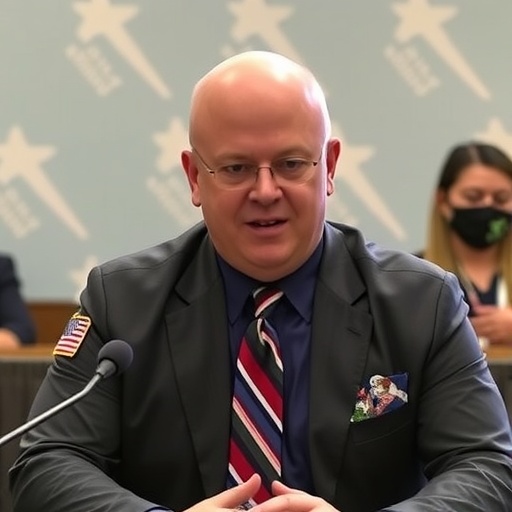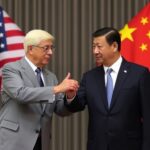Senator Mark Kelly Raises Alarms Over Legality of US Military Moves Near Venezuela Under Trump Administration
In a bold congressional hearing that has ignited debates across Washington, Democratic Senator Mark Kelly from Arizona has launched a pointed critique against the Trump administration’s decision to deploy an aircraft carrier battle group near Venezuela. Labeling the maneuver as ‘questionable’ at best, Kelly demanded immediate transparency from the White House and Pentagon, questioning whether the US military’s positioning adheres to international law and domestic statutes. This escalation comes amid heightened tensions in the region, where Venezuela’s ongoing political crisis has drawn sharp international scrutiny.
- Kelly’s Naval Expertise Fuels Fiery Congressional Challenge
- Venezuela’s Crisis: How Maduro’s Regime Sparked the US Military Response
- Pentagon Faces Intense Scrutiny Over Legal Justifications for Deployment
- Congressional Pushback Signals Broader Bipartisan Worries on Foreign Policy
- Future Ramifications: What Lies Ahead for US-Venezuela Tensions
The deployment, involving the USS Abraham Lincoln carrier strike group, was ostensibly aimed at supporting humanitarian efforts and countering perceived threats from the Venezuelan regime under President Nicolás Maduro. However, Kelly’s intervention highlights growing legal concerns within Congress about the boundaries of executive power in foreign policy. As a decorated astronaut and naval aviator with firsthand military experience, Kelly’s voice carries significant weight, amplifying calls for accountability in an era of aggressive US military posturing.
During a Senate Armed Services Committee session on Thursday, Kelly pressed Pentagon officials on the specifics of the operation, citing potential violations of the War Powers Resolution of 1973. ‘We cannot afford to operate in the shadows when it comes to deploying our brave service members,’ Kelly stated emphatically. ‘The American people deserve to know if this is a lawful action or a provocative gamble that risks broader conflict.’
Kelly’s Naval Expertise Fuels Fiery Congressional Challenge
Senator Mark Kelly, a former Navy captain and combat veteran who logged over 39 days in space aboard the Space Shuttle, brought his unparalleled military insight to the forefront of Thursday’s hearing. Having flown 39 combat missions during the Gulf War, Kelly is no stranger to the intricacies of naval deployments and their geopolitical ramifications. His criticism of the Trump administration’s US military activities near Venezuela stems from a deep-seated concern that the move lacks a robust legal foundation, potentially exposing American forces to unnecessary risks.
Kelly elaborated on his reservations in a post-hearing statement released to the press. ‘As someone who has commanded aircraft in hostile environments, I recognize the value of strategic positioning. But deploying a full carrier battle group—complete with destroyers, cruisers, and air wings—without clear congressional authorization raises red flags,’ he said. This isn’t mere rhetoric; Kelly referenced declassified documents from the deployment, which indicate the group sailed within 100 miles of Venezuelan waters in early April, prompting radar locks from Maduro’s forces and a tense standoff that lasted several hours.
The senator’s push for clarity extends beyond immediate threats. He invoked historical precedents, such as the 1983 Grenada invasion, where similar naval mobilizations led to debates over executive overreach. According to a Congressional Research Service report cited by Kelly, over 70% of major US military engagements since World War II have skirted full congressional approval, fueling ongoing legal concerns. Kelly argued that the Venezuela operation, framed by the Trump administration as a ‘defensive posture’ against regional instability, mirrors these patterns and demands scrutiny.
Supporters of Kelly within the Democratic caucus, including Senate Majority Leader Chuck Schumer, have echoed his sentiments. Schumer praised Kelly’s intervention as ‘a vital check on unchecked power,’ noting that the Arizona senator’s bipartisan appeal—stemming from his marriage to former Congresswoman Gabby Giffords—could sway moderate Republicans wary of escalating Latin American entanglements.
Venezuela’s Crisis: How Maduro’s Regime Sparked the US Military Response
The backdrop to this controversy is Venezuela’s spiraling humanitarian and political crisis, which has displaced over 7.7 million people since 2014, according to United Nations estimates. Under President Nicolás Maduro, the country has faced crippling hyperinflation—peaking at 1.7 million percent in 2018—and widespread food shortages, exacerbated by US sanctions imposed by the Trump administration in response to alleged election fraud and human rights abuses.
The deployment of the US military carrier group near Venezuela was announced in March as part of Operation Vital Resolve, a multifaceted initiative blending humanitarian aid delivery with deterrence against Maduro’s alliances with Russia and Iran. Pentagon spokespersons claimed the move was necessary to secure shipping lanes for aid convoys, which have faced blockades by Venezuelan security forces. In one incident last month, Venezuelan patrol boats intercepted a US-flagged vessel carrying 200 tons of medical supplies, leading to a diplomatic row that nearly involved the carrier group’s intervention.
Yet, legal concerns abound. International law experts, including those from the American Society of International Law, have questioned whether the carrier’s proximity constitutes a ‘threat of force’ under Article 2(4) of the UN Charter. ‘This isn’t just saber-rattling; it’s a carrier strike group capable of launching 75 aircraft strikes,’ noted Dr. Elena Ramirez, a professor at Georgetown University’s School of Foreign Service. Ramirez’s analysis, published in Foreign Affairs magazine, points to satellite imagery showing the USS Abraham Lincoln conducting flight operations just 200 nautical miles from Caracas, a move that Venezuelan state media decried as ‘imperialist aggression.’
From the Trump administration’s perspective, the deployment aligns with a broader strategy to isolate Maduro. National Security Advisor Robert O’Brien defended the action in a Fox News interview, stating, ‘We’re not invading; we’re protecting American interests and supporting the Venezuelan people against a dictator propped up by foreign adversaries.’ However, this justification has done little to assuage critics like Kelly, who argue it bypasses required notifications under the War Powers Act, which mandates presidential reporting to Congress within 48 hours of hostilities.
Pentagon Faces Intense Scrutiny Over Legal Justifications for Deployment
The Pentagon’s response to Senator Kelly’s queries has been measured but evasive, intensifying legal concerns surrounding the US military’s role near Venezuela. During the hearing, Defense Secretary Mark Esper testified that the deployment was authorized under the president’s Article II powers as commander-in-chief, emphasizing its non-combat nature. ‘This is about presence and deterrence, not provocation,’ Esper asserted, citing intelligence reports of Venezuelan MiG-29 jets conducting unauthorized flights near the carrier.
Nevertheless, Kelly pressed for specifics, requesting unredacted memos on the operation’s legal basis. A leaked internal email, obtained by The Washington Post, revealed Pentagon lawyers debating the deployment’s compliance with the Posse Comitatus Act, which limits military involvement in domestic affairs but has gray areas in international waters. Kelly highlighted this in his line of questioning: ‘If we’re this close to Venezuelan territory, how do we ensure we’re not crossing into unauthorized enforcement roles?’
Statistics underscore the scale: The carrier group includes over 7,500 personnel, 90 aircraft, and advanced missile systems, representing one of the largest US naval commitments to Latin America since the 1989 Panama invasion. According to the US Naval Institute, such deployments cost upwards of $6.5 million per day, raising fiscal questions alongside the legal ones. Bipartisan lawmakers, including Republican Senator Mitt Romney, have joined Kelly in calling for a joint oversight committee to review the Trump administration’s Venezuela strategy.
Legal experts weigh in heavily on these ambiguities. Harvard Law professor Jack Goldsmith, in a New York Times op-ed, warned that without clearer justification, the move could set a precedent for future administrations to deploy forces unilaterally. ‘The Venezuela case tests the limits of executive discretion,’ Goldsmith wrote. ‘Senator Kelly’s challenge is timely, as it forces a reckoning with how far ‘defensive’ actions can stretch.’
Congressional Pushback Signals Broader Bipartisan Worries on Foreign Policy
Senator Mark Kelly’s critique has galvanized a wider congressional pushback against the Trump administration’s foreign policy maneuvers, particularly regarding US military engagements in volatile regions like Venezuela. House Speaker Nancy Pelosi announced plans for parallel hearings in the House Foreign Affairs Committee, where lawmakers will probe the administration’s sanction regime and its military underpinnings. ‘Legal concerns aren’t partisan; they’re constitutional,’ Pelosi remarked, aligning with Kelly’s demand for transparency.
Republican voices, though more subdued, are emerging. Senator Lindsey Graham, a Trump ally, expressed ‘cautious support’ for the deployment but urged the Pentagon to provide Congress with operational briefings. This rare bipartisan convergence highlights the fragility of US-Venezuela relations, strained further by Maduro’s recognition of Juan Guaidó as interim president by over 50 nations, including the US.
Contextualizing the debate, Venezuela’s crisis has led to a refugee surge affecting neighboring countries: Colombia hosts 1.8 million Venezuelans, while Brazil grapples with border tensions. US aid efforts, totaling $600 million since 2017 per State Department figures, have been hampered by military posturing, with aid trucks vandalized in February’s failed border incursion. Kelly referenced these events, arguing that militarization undermines diplomatic solutions. ‘We need alliances, not aircraft carriers, to resolve this,’ he told reporters.
Public opinion polls reflect this sentiment: A Pew Research Center survey from last week shows 62% of Americans oppose direct military involvement in Venezuela, up from 45% in 2019. Advocacy groups like Human Rights Watch have amplified Kelly’s call, urging adherence to international humanitarian law to avoid exacerbating the refugee crisis.
Future Ramifications: What Lies Ahead for US-Venezuela Tensions
As Senator Mark Kelly’s challenge reverberates through Washington, the path forward for US military activities near Venezuela remains uncertain, with potential investigations looming on the horizon. The Senate Armed Services Committee has scheduled follow-up sessions for next month, where Kelly plans to subpoena additional documents from the Trump administration. Legal experts anticipate this could lead to a Supreme Court test on War Powers interpretations, echoing the 1973 case that birthed the resolution.
Broader implications extend to US foreign policy in Latin America. With elections approaching, the deployment could become a flashpoint, influencing voter perceptions of Trump’s ‘America First’ doctrine. Analysts from the Council on Foreign Relations predict that sustained pressure from Congress might force a partial withdrawal of the carrier group, redirecting focus to multilateral efforts through the Organization of American States.
For Venezuela, the stakes are existential. Maduro’s regime, facing internal dissent and economic collapse—GDP has shrunk 75% since 2013—may respond with provocations, such as joint exercises with Russian warships spotted off Caracas last week. Kelly has advocated for renewed sanctions relief tied to democratic reforms, warning that unchecked military escalation could destabilize the entire hemisphere.
In the coming weeks, watch for White House clarifications and possible congressional resolutions. As Kelly concluded in his remarks, ‘Transparency isn’t optional; it’s the bedrock of our democracy. The legal concerns here demand action before they demand regret.’ This saga underscores the delicate balance between security and sovereignty, with global eyes fixed on how the US navigates these turbulent waters.








